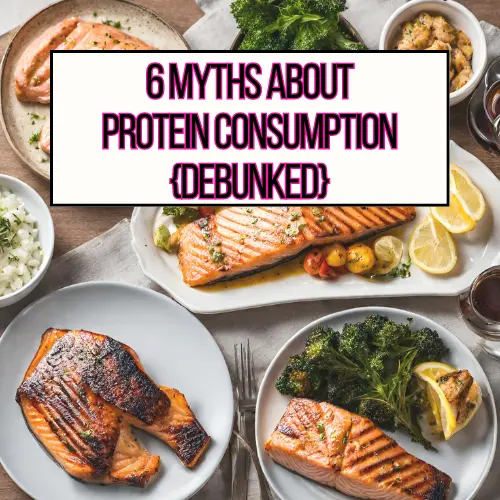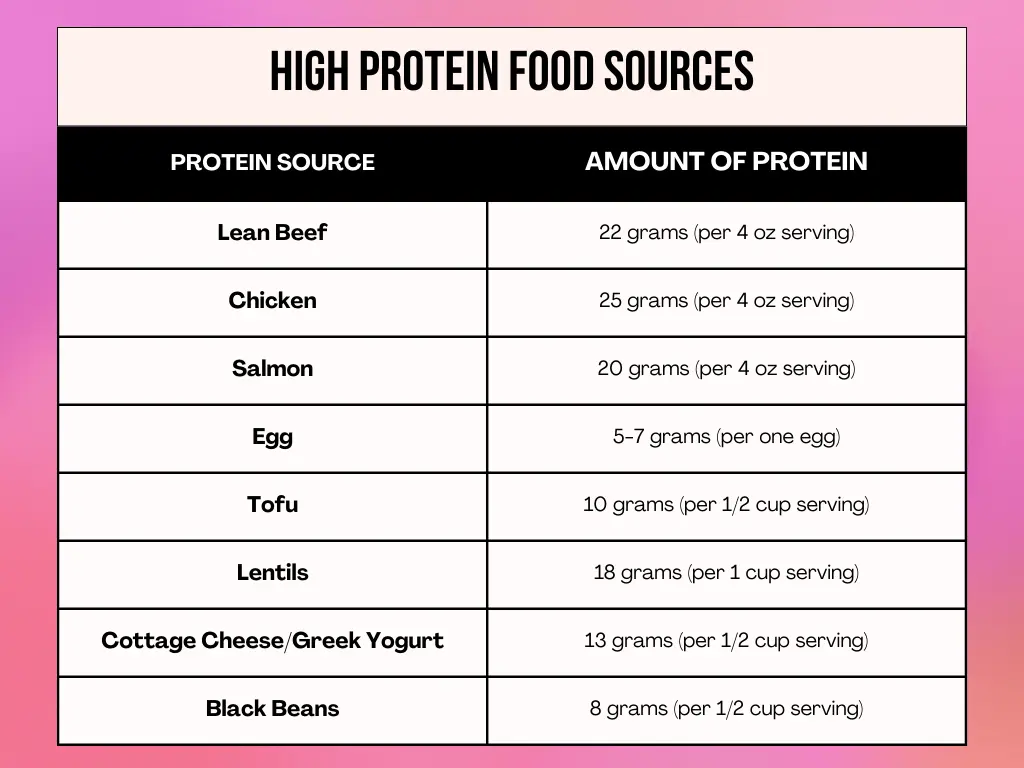Nutrition recommendations are always changing! In fact, there is still a lot of controversy among experts regarding when and how much protein to consume. That’s why it gets confusing – one minute, we have to eat within 15 minutes of working out and the next it doesn’t matter anymore. Let’s debunk the most common myths regarding protein and providing the latest research.

Protein seems to be THE topic these days, which is why I write about it a lot on this site. Not only is it necessary for numerous bodily functions, but it’s extremely helpful for weight management, meal satiety and changes in body composition.
So, let’s address all those burning questions that seem to come up in regards to protein consumption.
Myth #1: You Can Only Get Protein from Meat
Proteins are made up of amino acids, 9 of which cannot be synthesized by the body. Therefore, they are considered “essential” – and we must consume them from our diet.
It’s true that most plant-based protein sources have lower quantities of these essential amino acids when compared to animal protein sources. The amount of protein per serving is usually less, as well.
Therefore, it’s best to consume a variety of protein sources when consuming a plant-based diet and be aware of how to build higher protein meals. The variety ensures that you’re consuming adequate amounts of all the amino acids.
It might take a little bit more planning and preparation, but consuming a higher protein diet without meat is very realistic and may reduce the risk of many chronic diseases.
High Protein, Plant-Based Recipes and Resources:
— High Protein Plant-Based Meals with At Least 20 Grams of Protein
— High Protein Plant-Based Meal Prep Guide
— 120 Grams of Protein Vegetarian Meal Plan
Below is a table comparing the protein content of various food sources, plant-based and vegetarian options included.

Myth #2: You Should Consume 1 Gram per Pound of Body Weight
I am not sure where this one came from, but it seems that it’s an easy way for people to figure out their protein requirements. Quite frankly, this much protein may be unnecessary.
Most experts agree that the “ideal” amount of protein is somewhere in the range of 1.2-1.8 grams per kilogram of body weight – with upwards of 2 g/kg/day for some performance athletes.
So, for someone who weighs 150 pounds this is about 82-123 grams per day – not 150 grams!
According to numerous studies, there are no proposed benefits to consuming more than 2 g/kg/day. However, we aren’t really sure about the upper limit for protein (yet).
Myth #3: High Protein Diets Can Be Harmful
There is a difference between a “high protein” diet and excessive protein consumption. Like I stated above, the general consensus is not to consume more than 2-2.2 g/kg/day.
Long-term studies are needed to establish the potential risks of a diet which exceeds this amount.
It has been proposed that a high protein diet can lead to decreased kidney function, bone mineral loss, or increased risk of cardiovascular disease. However, the results from clinical research studies are conflicting.
A 2020 study did conclude high protein diets can increase the risk for cardiovascular disease, however, this could be related to overconsumption of red meat – which is high in saturated fat. Another study found that plant-based protein can actually have a protective effect against cardiovascular and heart disease.
High protein diets do not cause decreased kidney function, however, those with a pre-existing kidney condition are advised to watch their protein intake or follow a more plant-based diet.
High protein diets are generally recognized as safe. Though, not to sound like a broken record, limiting red meat consumption and utilizing more plant-based protein might be a good idea until more research is available.
Myth #4: Protein Powders are Necessary for Building Muscle
Protein powders are not necessary to build muscle but offer a convenient solution to those who have difficulty planning and preparing meals. However, the importance of protein from foods should be emphasized.
Protein powders are expensive, often contain unnecessary ingredients and are not regulated – meaning we don’t really know if the ingredients listed on the label are present in the product (unless third-party tested). Plus, most healthy adults can consume all the protein they need from a well-balanced diet.
It is true that whey protein is considered the “gold standard” when it comes to building muscle as it is a high-quality protein source and absorbed the fastest. However, whey is found in dairy products (much cheaper than protein powders, too).
Myth #5: You Need to Eat Protein Immediately After a Workout
A 2023 meta-analysis of various randomized controlled studies found that consuming protein pre/post exercise and at night is key to increasing muscle strength and mass.
In contrast, a 2020 systematic review found no beneficial effect on consuming protein at a specific time post-workout.
Overall consensus seems to still be that total protein intake throughout the day is more important than post-workout timing – but further research is needed.
Myth #6: Our Body Only Uses a Certain Amount of Protein for Muscle Protein synthesis
It has long been said that our body uses 25-40 grams of protein for muscle protein synthesis – and consuming more than that at any given time is used by the body in other ways or stored as fat.
In 2018, the Journal of the International Society of Sports Nutrition published a study which stated we should consume protein at a target intake of 0.4 g/kg/meal across a minimum of four meals in order to reach a minimum of 1.6 g/kg/day.
A new study published in 2023 challenged this notion. Participants experienced a greater and longer anabolic response when ingesting 100 grams of protein as compared to those who consumed 25 grams of protein.
This might be indicative that we don’t necessarily have to limit meals and snacks to less than 40 grams to see gains in lean body mass and muscle strength. However, most experts agree that it is a much more realistic approach to consume higher protein meals distributed evenly throughout the day – especially for women.
Related Posts:
— 120 Grams of Protein Per Day with Meal Plans
— 30+ Breakfasts with 30 Grams of Protein
Conclusion
While research regarding the timing, amount, and type of protein considered “ideal” is ongoing, there seems to be enough evidence to say that a “higher” protein diet of 1.2-1.8 g/kg/day can promote positive changes in our body composition without any harmful effects.
It’s important to consider the type of protein you’re ingesting while increasing your protein consumption. I would recommend 1) limiting red meat consumption, 2) consuming more lean protein in 4 ounce servings and 3) trying to include more plant-based protein in your diet.
This will ensure that you’re not only reaching your protein goals, but also potentially reducing your risk for heart disease, certain types of cancer, and diabetes. The timing of protein post-workout doesn’t seem to hold as much weight as it used to.
